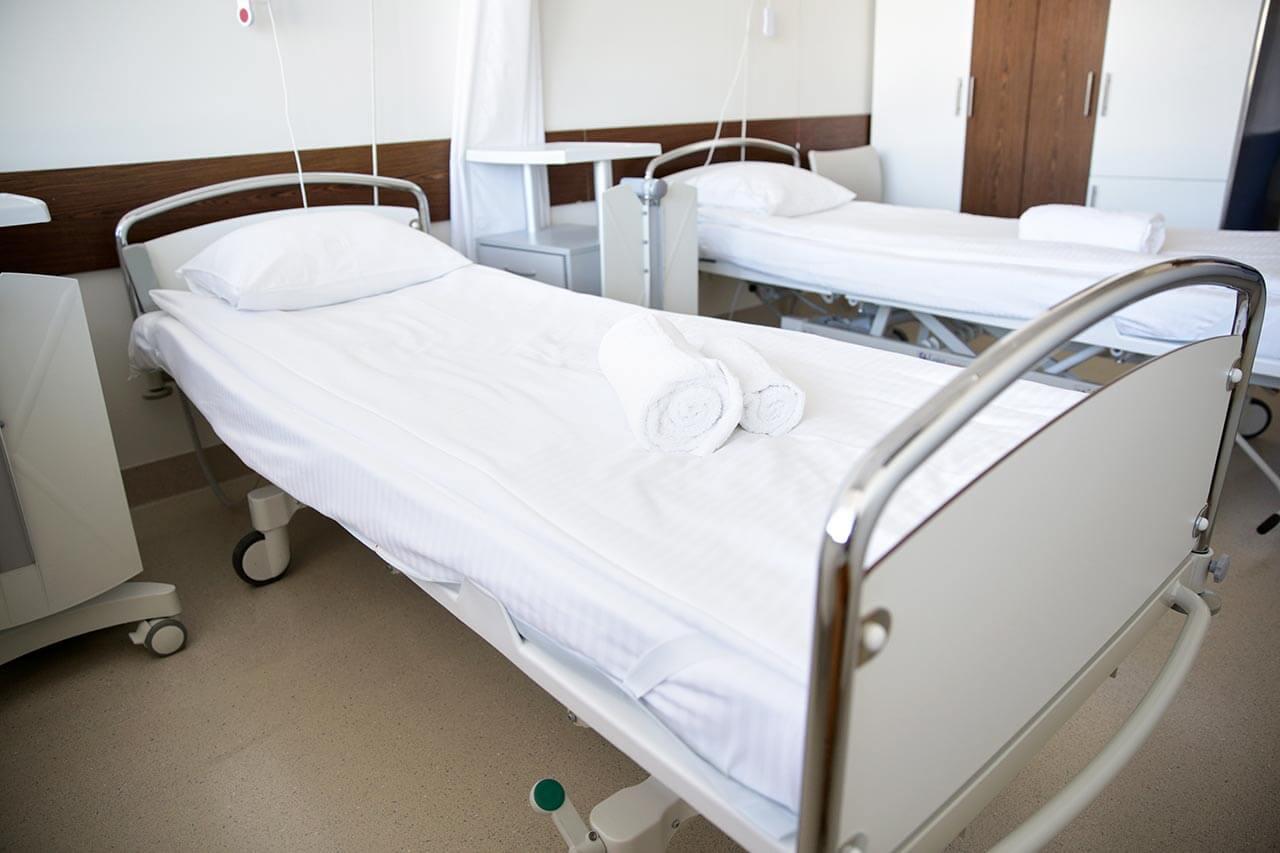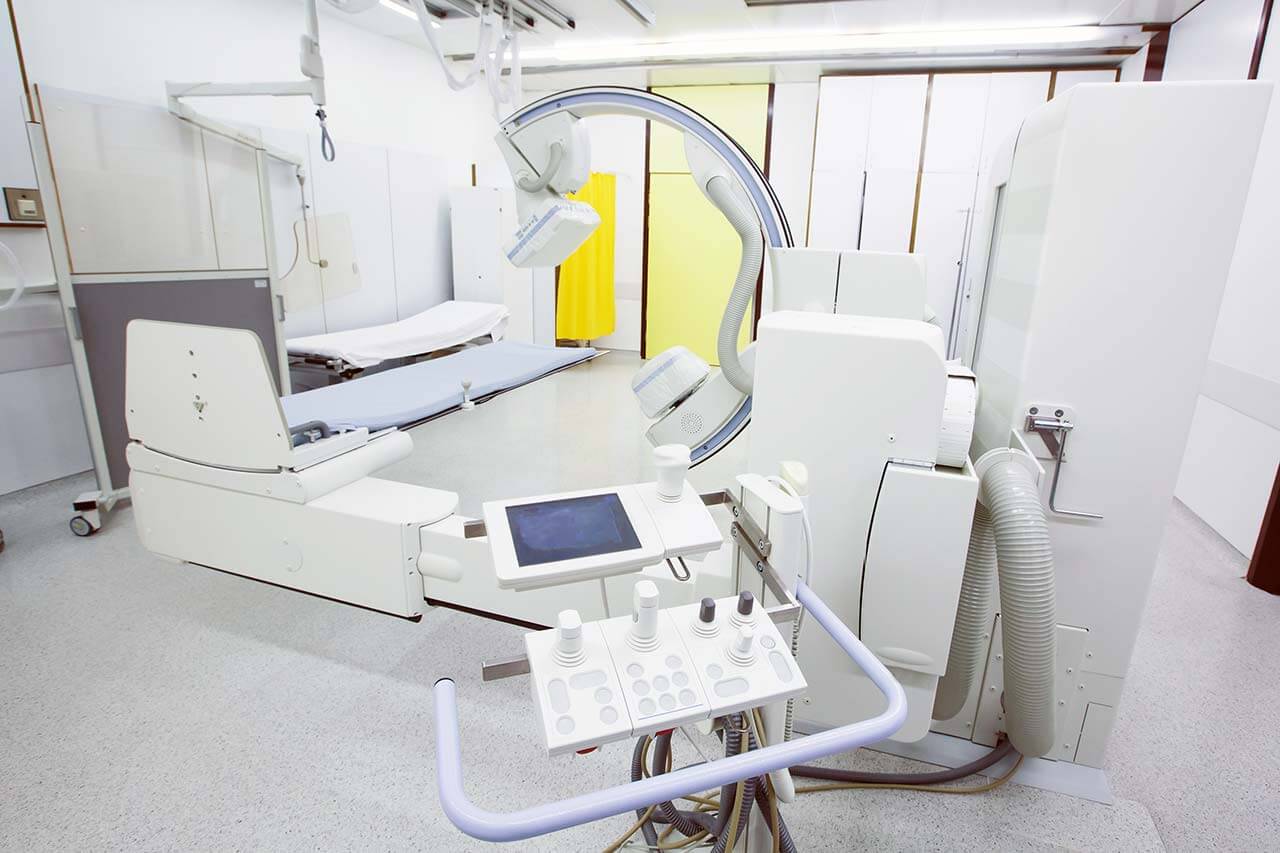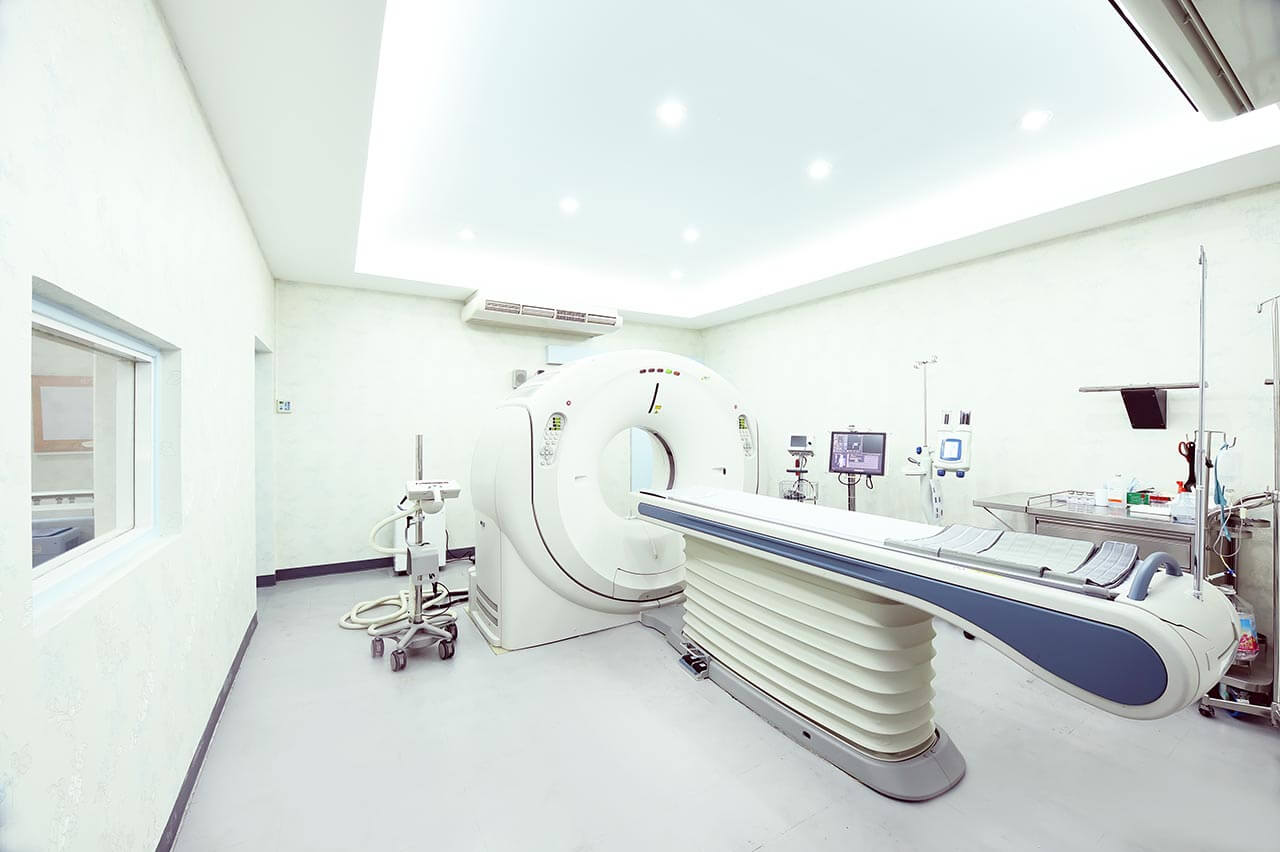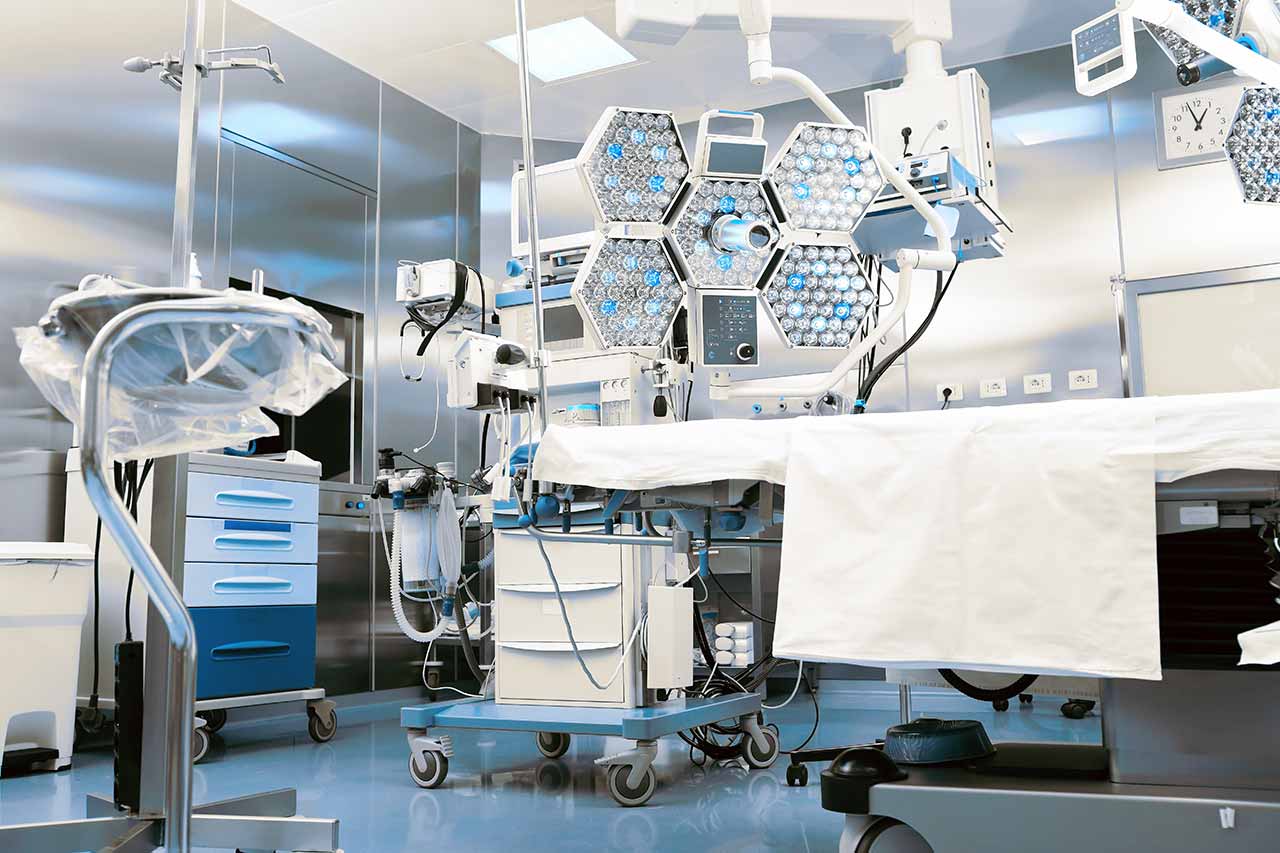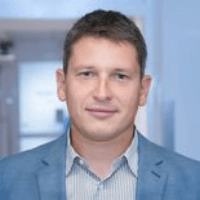
The program includes:
- Initial presentation in the hospital
- Clinical history taking
- Evaluating the available medical reports
- General clinical examination
- Urological examination
- Laboratory tests:
- Complete blood count
- Biochemical analysis of blood
- Inflammation indicators (CRP, ESR)
- Indicators of blood coagulation
- Tumor markers, PSA
- Ultrasound scan of the urogenital system
- CT scan/MRI of the abdomen and pelvis
- Preoperative care
- Removal of prostate tumor metastases with a gamma probe
- Consultations of related specialists
- Symptomatic treatment
- Cost of essential medicines
- Nursing services
- Control examinations
- Stay in the hospital with full board
- Accommodation in 2-bedded ward
- Recommendations regarding further treatment
Indications
- Confirmed prostate cancer with suspected metastasizing
How program is carried out
During the first visit, the physician will conduct a clinical examination and go through the results of the available examinations. After that, you will undergo the necessary additional examination, such as the assessment of liver and kidney function, ultrasound scan of the abdominal and pelvic organs. Based on the results, the physician will determine the number and localization of metastases, and plan the upcoming intervention.
On the eve of the intervention, you will receive an injection of radioactively labeled PSMA. PSMA is the substance that binds to the smallest prostate cancer metastases in the lymph nodes and other tissues. The radioactive label will allow the surgeon to find all the metastases during the operation.
Removal of prostate tumor metastases with a gamma probe starts with general anesthesia. After anesthesia, the surgeon makes small incisions through which he inserts endoscopic instruments, a gamma probe and a video camera into the pelvic cavity and abdominal cavity. The gamma probe detects the lymph nodes affected by metastases by a radioactive label, and the surgeon removes them endoscopically. The video camera continuously transmits a three-dimensional image of the operating field in 12-fold magnification to the monitor.
As the surgeon sees the operating field in multiple magnification, he preserves the nerve endings and large blood vessels. This significantly reduces the surgical risks. The gamma probe, in turn, allows detecting and removing all metastases, which minimizes the risk of prostate cancer recurrence.
After the completion of the operation, you will be transferred back to the ward, under the supervision of the attending physician and nursing staff. Due to the minimal invasiveness of the operation and the short duration of general anesthesia, you will not need to stay in the intensive care unit for a long time.
Finally, the attending physician will evaluate the results of control examinations, schedule the date of discharge from the hospital and give you detailed recommendations for further follow-up and treatment.
Required documents
- Medical records
- PSA blood test
- MRI/CT scan (not older than 3 months)
- Bone scintigraphy (if available)
- Biopsy results (if available)
Service
You may also book:
 BookingHealth Price from:
BookingHealth Price from:
About the department
The Department of Nuclear Medicine at the University Hospital Essen offers the full range of radioisotope diagnostics and treatment. Of particular interest is the detection and treatment of thyroid diseases, endocrine tumors. The department also specializes in radioiodine therapy for the treatment of thyroid diseases, radionuclide therapy for bone metastases, MIBG therapy for the treatment of neuroblastomas, malignant pheochromocytes and many other therapies. In addition, the department operates its own Radiopharmaceutical Section, which produces radiopharmaceuticals for two positron emission tomography (PET) scanners. The department is headed by Prof. Dr. med. Ken Herrmann.
The diagnostic and therapeutic service range of the department includes:
- Diagnostic examinations
- Thyroid gland diagnostics
- Ultrasound examinations of the thyroid gland (high resolution)
- Thyroid scintigraphy
- Fine needle aspiration biopsy
- Laboratory tests
- PET and PET-CT cancer diagnostics
- Kidney scintigraphy
- Lung scintigraphy
- Heart diagnostics
- Myocardial scintigraphy
- Heart scintigraphy
- 18F-FDG-PET
- Skeletal scintigraphy
- Gastrointestinal diagnostics
- Salivary gland scintigraphy
- Esophageal scintigraphy
- Thyroid gland diagnostics
- Treatment methods
- Radioiodine therapy for the treatment of thyroid hyperfunction, diffuse goiter, thyroid malignant tumors
- DOTATOC therapy for the treatment of neuroendocrine tumors
- Lu-177 PSMA therapy for the treatment of metastatic prostate cancer
- MIBG therapy for the treatment of neuroendocrine tumors, for example, malignant pheochromocytoma and neuroblastoma, neuroendocrine tumors of the digestive tract and other rare tumors, such as medullary thyroid carcinoma
- Selective internal radiation therapy (SIRT) with 90Y microspheres for the treatment of hepatocellular carcinoma, liver metastases in breast cancer, neuroendocrine tumors and colorectal cancer
- Intracavitary therapy with citrate colloid (90Y) in recurrent malignant ascites
- Zevalin therapy (90Y), for example, for the treatment of CD20 positive non-Hodgkin's lymphoma
- Radionuclide pain therapy in bone metastases
- Other diagnostic and therapeutic options
Curriculum vitae
Professional Activities
- 1997 - 2004 Study of Medicine at the Charite Medical School in Berlin.
- Internships in France, Switzerland, Chile and USA.
- 2009 - 2011 Magistracy in Business Administration at the University of Zurich (without leaving the main activities).
- Training for a Medical Specialist at the University Hospital Rechts der Isar Munich at the Technical University of Munich.
- 2011 - 2015 Visiting Assistant Professor at the University of California, Los Angeles.
- 2012 - 2016 Managing Senior Physician and Deputy Head of the Department of Nuclear Medicine at the University Hospital Würzburg.
- 2015 - 2016 Assistant Professor and Head of the Ahmanson Translational Imaging Division at the University of California, Los Angeles.
- Since 2016 to the present time, Associate Professor at the University of California in Los Angeles.
- Since 2016 Head of the Department of Nuclear Medicine at the University Hospital Essen.
Clinical Focuses
- Diagnostics and treatment of thyroid diseases (especially cancer).
- Diagnostics and treatment of other endocrine tumors (Ga-68 Dotatoc therapy, I-124 MIBG therapy).
- Diagnostics (Ga-68 PSMA-PET/CT) and prostate cancer therapy (Lu-177 PSMA therapy).
- Selective intraarterial radionuclide therapy (SIRT) in liver tumors.
- PET Center with two PET/CT and one PET/MRI.
Research Focuses
- Development and application of new radiopharmaceuticals.
- Diagnostics and treatment of thyroid cancer.
- Diagnostics and treatment of endocrine tumors.
- Diagnostics and treatment of prostate cancer.
- Clinical use, optimization of PET, PET/CT.
Membership in Professional Societies
- Member of the European Association of Nuclear Medicine (EANM).
- Member of the Imaging Group, European Organisation for the Research and Treatment of Cancer (EORTC).
- DRG Committee Member, German Society of Nuclear Medicine.
Photo of the doctor: (c) Universitätsklinikum Essen
About hospital
According to the authoritative Focus magazine the University Hospital Essen ranks among the top German hospitals!
With 27 specialized departments and 24 institutes, the hospital in Germany is a maximum care medical facility. The hospital has 1,300 beds for inpatient treatment. A highly qualified medical team of more than 6,000 employees takes care of the health of patients. All the specialists give preference to an interdisciplinary medical care, which guarantees a comprehensive treatment taking into account the smallest aspects of a particular pathology. The hospital annually diagnoses and treats more than 50,000 inpatients and about 195,000 outpatients, which testifies to the prestige of the medical institution and the highest quality of treatment in Germany.
The hospital presents all the modern medical fields. Nevertheless, special attention should be given to the following major fields of specialization as oncology, transplantology and cardiology, as well as research activities in the field of immunology, infectology and translational examinations of pathologies of the nervous system and behavioral disorders.
Established on the basis of the standard American model of Comprehensive Cancer Centers, the West German Cancer Center (WTZ) in Essen was recognized as the best medical facility of this kind in Germany in 2009. Nowadays, the center holds leading positions both on the national and international medical markets. The basis of its successful clinical practice is the use of very latest treatment methods and an interdisciplinary approach to each clinical case. The West German Organ Transplant Centre (WZO) is also recognized as one of the best in the country and one of the few in Germany, which specializes in the transplantation of all vital organs, such as kidney, liver, pancreas, heart and lungs. Special attention is paid to kidney and liver transplantation.
The hospital in Germany is proud of its high-tech medical equipment, experienced and competent staff, productive research activities, which allow to guarantee the accurate diagnostics and effective treatment, including rare and very complex clinical cases for every patient. Consequently, the hospital is considered a perfect embodiment of high-quality treatment in Germany.
Photo: (c) depositphotos
Accommodation in hospital
Patients rooms
The patients of the University Hospital Essen live in comfortable rooms designed in bright colors. The standard room furnishing includes an automatically adjustable bed, a bedside table, a personal wardrobe, a personal call button with a built-in light panel, a telephone, a TV and a radio. The Internet access is available at an additional cost.
Meals and Menus
The patients of the hospital are offered a daily choice of three menus. The patients are also offered alternative types of menus, if their religion requires the exclusion of certain foods. If you follow a certain diet or suffer from food intolerance, you will be provided with a menu of your choice by discussing it with your attending physician in advance. The hospital also houses a bistro and a cafe, where one can have a tasty snack, enjoy hot and cold drinks.
Further details
Standard rooms include:
Accompanying person
There are a few types of hotels for the accompanying persons, who want to stay near the hospital. The hotel of the Essen University Hospital offers apartments on the first floor of the nursing high-rise building. The DRK nursing also offers single and double rooms.
The hotel in Grugapark is available for the parents, whose children stay in the hospital. The parents of children with cancer can also stay here. Moreover, The Department of Pediatrics offers its rooms for parents.
